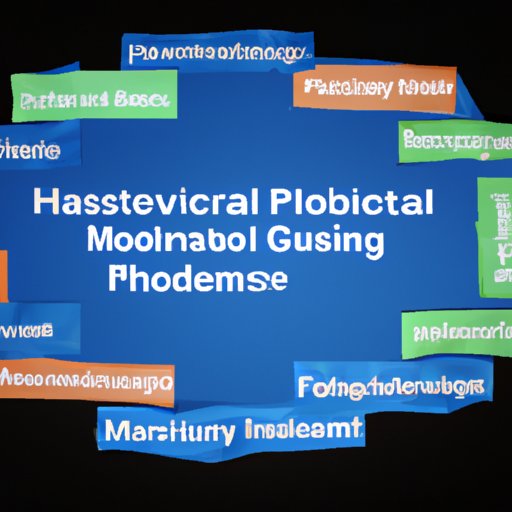
Overview of a Masters in Public Health
A Masters in Public Health (MPH) is a graduate degree that focuses on the science and practice of protecting and improving the health of communities through education, research and policy. The goal of this degree program is to provide students with the knowledge and skills needed to effectively manage public health initiatives and programs in both the public and private sectors.
What You Can Do With It
With an MPH degree, graduates can pursue a number of career paths, such as public health analyst, community health educator, epidemiologist or health administrator. These professionals work to improve public health by promoting healthy lifestyles, conducting research into diseases and illnesses, and developing policies aimed at preventing disease and promoting wellness.

The Benefits of Obtaining a Masters in Public Health
Obtaining a Masters in Public Health offers many benefits, including improved knowledge and understanding of public health, increased professional opportunities, and the ability to make a positive impact on society. According to the Centers for Disease Control and Prevention (CDC), “Public health professionals play a critical role in addressing the nation’s most pressing health challenges, from chronic diseases to emerging infectious diseases.”
Improved Knowledge and Understanding of Public Health
An MPH degree provides students with a comprehensive understanding of public health issues and how to address them. Students learn about the principles of public health, including epidemiology, biostatistics, environmental health, health services administration, health promotion, and global health. Through coursework and hands-on experience, students gain the skills necessary to assess public health needs, develop effective strategies for addressing them, and evaluate the impact of those strategies.
Increased Professional Opportunities
An MPH degree opens up a variety of professional opportunities. With an MPH, graduates can pursue a range of positions in government agencies, non-profit organizations, hospitals, universities, and other health-related settings. In addition, many employers are now seeking out individuals with an MPH degree, as they recognize the value of having professionals who understand the complexities of public health.
Ability to Make a Positive Impact
Perhaps the most rewarding aspect of obtaining an MPH is the opportunity to make a positive impact on the health of communities. Graduates with an MPH have the knowledge and skills to help reduce health disparities, improve access to healthcare, and promote healthy lifestyles. As stated by Dr. Stephen B. Thomas, director of the Maryland Center for Health Equity, “We have the power to make sure everyone has a fair chance to be as healthy as possible. That’s what public health is all about.”
Exploring the Different Types of Masters in Public Health Programs
When it comes to choosing a Masters in Public Health program, there are a few different options available. Here we explore the different types of programs available, as well as some of the specializations offered.
Online Programs
For those looking for more flexibility, online MPH programs are a great option. These programs allow students to complete their studies from the comfort of their own home, while still providing the same quality of instruction as traditional on-campus programs. Many online programs also offer accelerated tracks, allowing students to complete their degree in less time.
Traditional On-Campus Programs
For those who prefer a more traditional learning environment, on-campus MPH programs are a great option. These programs typically involve lectures, seminars, and lab work, as well as field trips and internships. Most on-campus programs also require students to complete a capstone project prior to graduation.
Specializations Available
Most MPH programs offer a variety of specializations, allowing students to tailor their degree to their specific interests and career goals. Common specializations include health policy and management, global health, epidemiology, biostatistics, and health education and promotion.

How to Choose the Right Masters in Public Health Program for You
When considering which Masters in Public Health program is right for you, there are a few key factors to consider. Here we take a look at the steps to take when researching and evaluating programs.
Assessing Your Goals and Interests
The first step in choosing the right program is to assess your goals and interests. Think about what areas of public health you are most passionate about and what type of career you want to pursue after graduation. This will help you narrow down your list of potential programs.
Researching Accreditation Requirements
It is important to make sure that any program you are considering is accredited by the Council on Education for Public Health (CEPH). Accreditation ensures that the program meets certain standards of quality and provides students with a comprehensive education in public health.
Evaluating Cost and Financial Aid Options
Cost is another important factor to consider when researching programs. Look into the tuition costs of each program you are considering, as well as any financial aid or scholarship opportunities available. Many schools offer discounts for military members, veterans, and other groups.
Career Opportunities with a Masters in Public Health Degree
With an MPH degree, graduates can pursue a number of career paths, such as public health analyst, community health educator, epidemiologist or health administrator. These professionals work to improve public health by promoting healthy lifestyles, conducting research into diseases and illnesses, and developing policies aimed at preventing disease and promoting wellness.
Public Health Analyst
Public health analysts use data to identify public health issues, develop strategies to address them, and evaluate the impact of those strategies. They may also be involved in collecting and analyzing data on disease outbreaks, health disparities, health outcomes, and other public health topics.
Community Health Educator
Community health educators work to promote healthy behaviors and educate individuals and communities on health-related topics. They often design and implement educational campaigns, provide health screenings and referrals, and collaborate with other health professionals.
Epidemiologist
Epidemiologists study the patterns, causes, and effects of disease and illness in populations. They use data to identify risk factors and develop strategies to prevent and control the spread of disease. Epidemiologists may also conduct research and analyze data related to public health issues.
Health Administrator
Health administrators are responsible for managing the operations of health care facilities. They oversee staff, develop budgets and policies, and ensure compliance with laws and regulations. Health administrators may also be involved in planning and implementing public health initiatives.
Conclusion
A Masters in Public Health is an excellent choice for those interested in making a positive impact on society by improving public health standards. With a wide range of programs and specializations available, there is something to suit every individual’s goals and interests.
(Note: Is this article not meeting your expectations? Do you have knowledge or insights to share? Unlock new opportunities and expand your reach by joining our authors team. Click Registration to join us and share your expertise with our readers.)
